中国独生子女政策Chinese one-child policy
- 格式:doc
- 大小:32.00 KB
- 文档页数:2
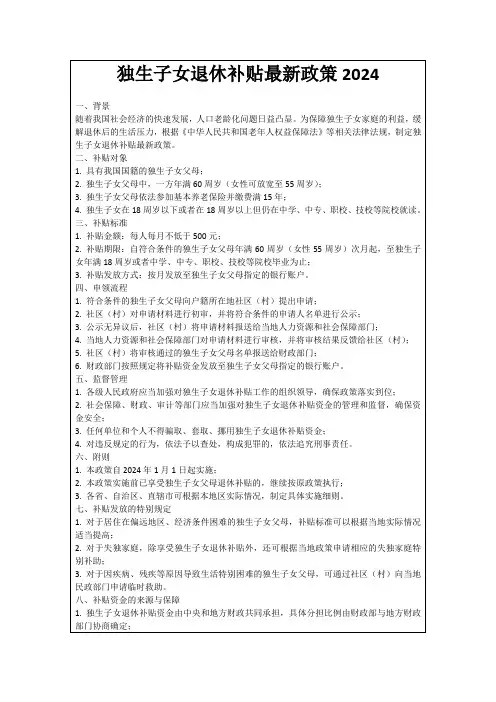
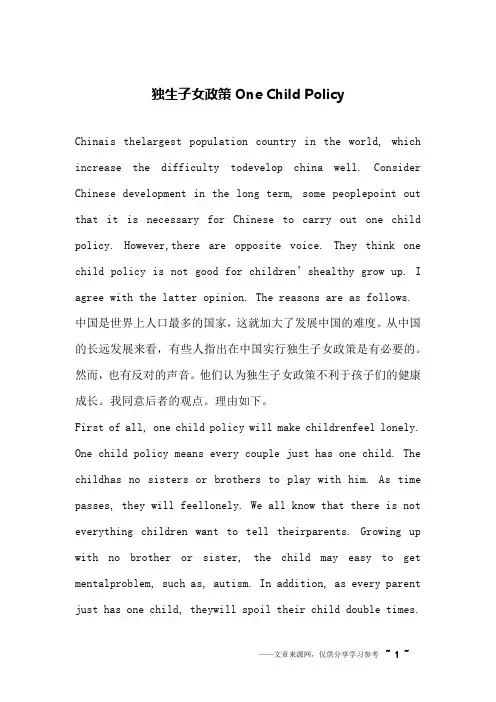
独生子女政策One Child PolicyChinais thelargest population country in the world, which increase the difficulty todevelop china well. Consider Chinese development in the long term, some peoplepoint out that it is necessary for Chinese to carry out one child policy. However,there are opposite voice. They think one child policy is not good for children’shealthy grow up. I agree with the latter opinion. The reasons are as follows. 中国是世界上人口最多的国家,这就加大了发展中国的难度。
从中国的长远发展来看,有些人指出在中国实行独生子女政策是有必要的。
然而,也有反对的声音。
他们认为独生子女政策不利于孩子们的健康成长。
我同意后者的观点。
理由如下。
First of all, one child policy will make childrenfeel lonely. One child policy means every couple just has one child. The childhas no sisters or brothers to play with him. As time passes, they will feellonely. We all know that there is not everything children want to tell theirparents. Growing up with no brother or sister, the child may easy to get mentalproblem, such as, autism. In addition, as every parent just has one child, theywill spoil their child double times.As a result, the child will the so called littleemperor or little princess. When the child grows up, it is possible thathe couldn’t adjust the world, the society, because no one will treat them aslittle emperor or little princess except their parents.首先,独生子女政策会让孩子感到孤独。
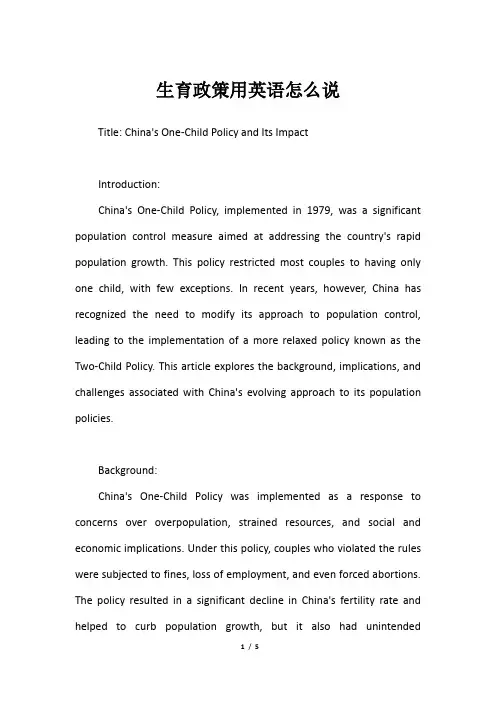
生育政策用英语怎么说Title: China's One-Child Policy and Its ImpactIntroduction:China's One-Child Policy, implemented in 1979, was a significant population control measure aimed at addressing the country's rapid population growth. This policy restricted most couples to having only one child, with few exceptions. In recent years, however, China has recognized the need to modify its approach to population control, leading to the implementation of a more relaxed policy known as the Two-Child Policy. This article explores the background, implications, and challenges associated with China's evolving approach to its population policies.Background:China's One-Child Policy was implemented as a response to concerns over overpopulation, strained resources, and social and economic implications. Under this policy, couples who violated the rules were subjected to fines, loss of employment, and even forced abortions. The policy resulted in a significant decline in China's fertility rate and helped to curb population growth, but it also had unintendedconsequences.Implications of the One-Child Policy:1. Gender Imbalance: The preference for male heirs and the societal pressure to have a male child led to a significant gender imbalance, with many families resorting to gender-based abortions or even female infanticide. This imbalance has created social issues, including difficulties in finding suitable partners for marriage and potential societal unrest.2. Aging Population: The low birth rate resulting from the One-Child Policy has contributed to an aging population, placing a strain on the country's healthcare system, pension funds, and overall economic productivity.3. Workforce Challenges: With a shrinking labor force, China faced challenges in meeting the demands of its growing economy, leading to labor shortages in some industries.Transition to the Two-Child Policy:Recognizing the need for change, China introduced the Two-Child Policy in 2023. This policy allowed couples to have a second child, aiming to address the issues arising from the One-Child Policy and stimulate population growth. However, despite the policy change, the desired impact has not been fully realized due to various factors.Challenges and Future Outlook:1. Economic Factors: High living costs, long work hours, and career aspirations have led many couples to opt for smaller families or delay having children altogether.2. Cultural Shift: After decades of adhering to the One-Child Policy, some couples are reluctant to have a second child due to the associated financial burdens and increased responsibilities.3. Gender Equality: Addressing the gender imbalance resulting from decades of gender-based preferences and stereotypes requires comprehensive social and cultural changes.Conclusion:China's population policies have undergone significant changes over the past few decades, with the One-Child Policy having a profound impact on the country. While the policy successfully curbed population growth, it also created several challenges such as a gender imbalance and an aging population. The transition to the Two-Child Policy aimed to address these issues, but certain obstacles remain. To ensure sustainable population growth and address the long-term consequences of past policies, China must continue to adapt its approach, considering economic, cultural, and social factors.生育政策是指由政府制定和实施的与人口生育相关的政策。
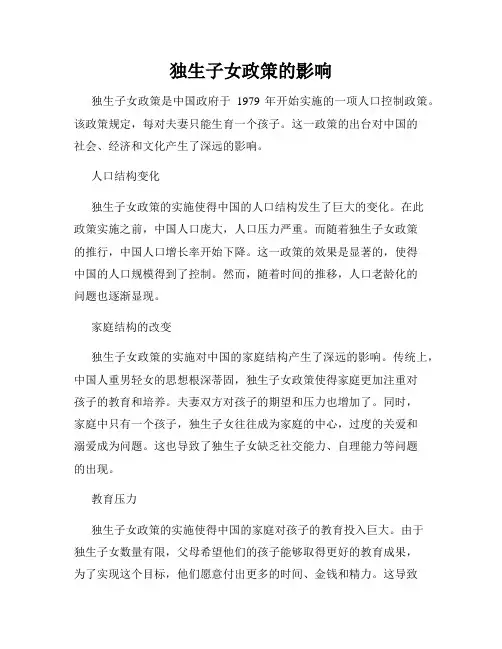
独生子女政策的影响独生子女政策是中国政府于1979年开始实施的一项人口控制政策。
该政策规定,每对夫妻只能生育一个孩子。
这一政策的出台对中国的社会、经济和文化产生了深远的影响。
人口结构变化独生子女政策的实施使得中国的人口结构发生了巨大的变化。
在此政策实施之前,中国人口庞大,人口压力严重。
而随着独生子女政策的推行,中国人口增长率开始下降。
这一政策的效果是显著的,使得中国的人口规模得到了控制。
然而,随着时间的推移,人口老龄化的问题也逐渐显现。
家庭结构的改变独生子女政策的实施对中国的家庭结构产生了深远的影响。
传统上,中国人重男轻女的思想根深蒂固,独生子女政策使得家庭更加注重对孩子的教育和培养。
夫妻双方对孩子的期望和压力也增加了。
同时,家庭中只有一个孩子,独生子女往往成为家庭的中心,过度的关爱和溺爱成为问题。
这也导致了独生子女缺乏社交能力、自理能力等问题的出现。
教育压力独生子女政策的实施使得中国的家庭对孩子的教育投入巨大。
由于独生子女数量有限,父母希望他们的孩子能够取得更好的教育成果,为了实现这个目标,他们愿意付出更多的时间、金钱和精力。
这导致了教育资源的不平衡和教育竞争的激烈。
独生子女常常面临着来自家庭和社会的巨大压力,他们需要在学业和各种培训班之间找到平衡,这对他们的身心健康造成了一定的影响。
经济影响独生子女政策的实施对中国国家的经济也产生了重大影响。
一方面,因为只有一个孩子,家庭对孩子的经济压力较小,更有能力供给孩子更好的教育和生活条件。
另一方面,人口减少导致劳动力市场供应紧张,这对国家的经济发展造成了一定的阻碍。
同时,人口老龄化也增加了养老保障的压力。
社会问题独生子女政策的实施导致了一些社会问题的出现。
由于男女比例失衡,婚姻市场产生了一些问题,男性更容易找到合适的配偶,女性则面临较大的竞争压力。
此外,独生子女政策也带来了孤独和缺乏兄弟姐妹关系的问题,许多独生子女缺乏与同龄人交往的机会,容易出现社交障碍和情感孤立。
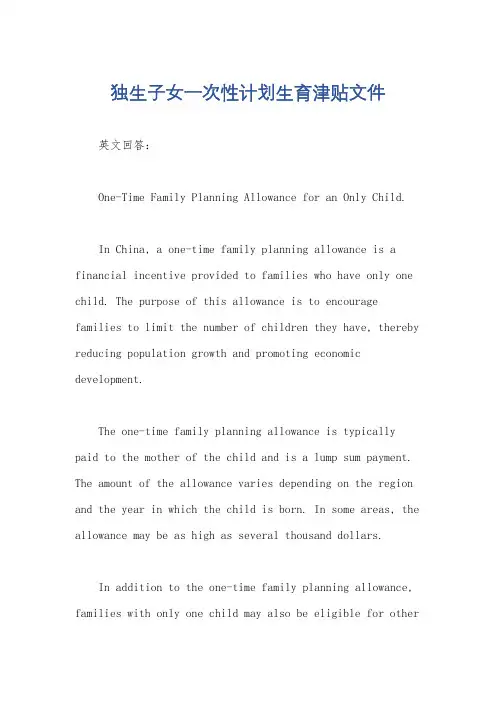
独生子女一次性计划生育津贴文件英文回答:One-Time Family Planning Allowance for an Only Child.In China, a one-time family planning allowance is a financial incentive provided to families who have only one child. The purpose of this allowance is to encourage families to limit the number of children they have, thereby reducing population growth and promoting economic development.The one-time family planning allowance is typically paid to the mother of the child and is a lump sum payment. The amount of the allowance varies depending on the region and the year in which the child is born. In some areas, the allowance may be as high as several thousand dollars.In addition to the one-time family planning allowance, families with only one child may also be eligible for otherbenefits, such as:Extended maternity leave.Reduced childcare costs.Tax breaks.Priority access to education and housing.Families who have more than one child may be subject to fines or other penalties. The Chinese government has implemented a strict family planning policy since the 1970s, and this policy has been successful in reducing population growth. However, the policy has also been criticized for being too harsh and for leading to human rights abuses.中文回答:独生子女一次性计划生育津贴。
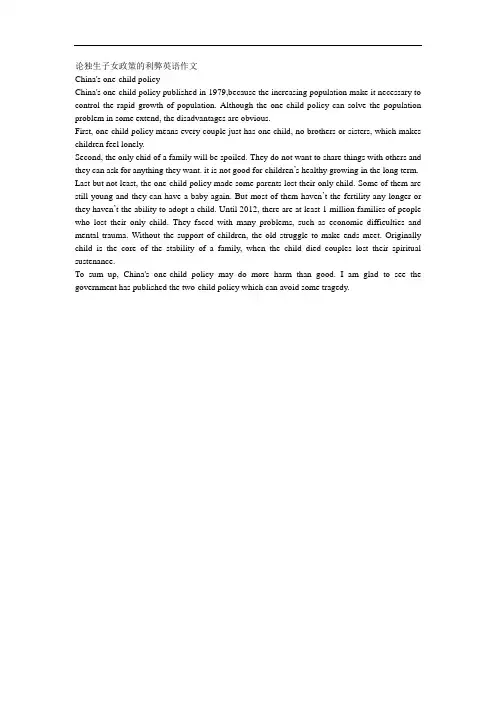
论独生子女政策的利弊英语作文China's one-child policyChina's one-child policy published in 1979,because the increasing population make it necessary to control the rapid growth of population. Although the one child policy can solve the population problem in some extend, the disadvantages are obvious.First, one-child policy means every couple just has one child, no brothers or sisters, which makes children feel lonely.Second, the only chid of a family will be spoiled. They do not want to share things with others and they can ask for anything they want. it is not good for children’s healthy growing in the long term. Last but not least, the one-child policy made some parents lost their only child. Some of them are still young and they can have a baby again. But most of them haven’t the fertility any longer or they haven’t the ability to adopt a child. Until 2012, there are at least 1 million families of people who lost their only child. They faced with many problems, such as economic difficulties and mental trauma. Without the support of children, the old struggle to make ends meet. Originally child is the core of the stability of a family, when the child died couples lost their spiritual sustenance.To sum up, China's one-child policy may do more harm than good. I am glad to see the government has published the two-child policy which can avoid some tragedy.。
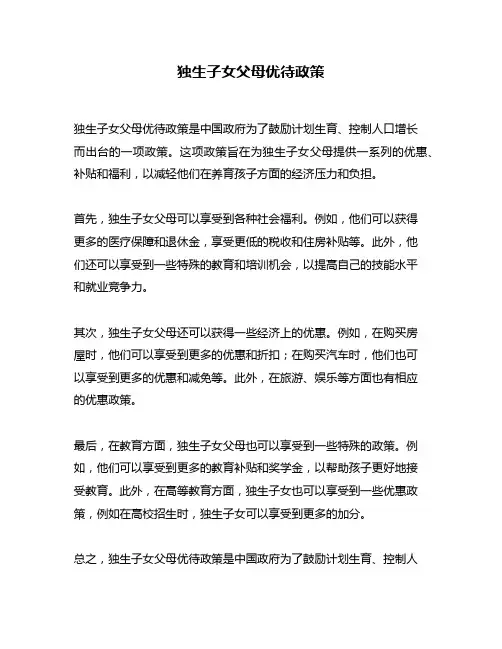
独生子女父母优待政策
独生子女父母优待政策是中国政府为了鼓励计划生育、控制人口增长
而出台的一项政策。
这项政策旨在为独生子女父母提供一系列的优惠、补贴和福利,以减轻他们在养育孩子方面的经济压力和负担。
首先,独生子女父母可以享受到各种社会福利。
例如,他们可以获得
更多的医疗保障和退休金,享受更低的税收和住房补贴等。
此外,他
们还可以享受到一些特殊的教育和培训机会,以提高自己的技能水平
和就业竞争力。
其次,独生子女父母还可以获得一些经济上的优惠。
例如,在购买房
屋时,他们可以享受到更多的优惠和折扣;在购买汽车时,他们也可
以享受到更多的优惠和减免等。
此外,在旅游、娱乐等方面也有相应
的优惠政策。
最后,在教育方面,独生子女父母也可以享受到一些特殊的政策。
例如,他们可以享受到更多的教育补贴和奖学金,以帮助孩子更好地接
受教育。
此外,在高等教育方面,独生子女也可以享受到一些优惠政策,例如在高校招生时,独生子女可以享受到更多的加分。
总之,独生子女父母优待政策是中国政府为了鼓励计划生育、控制人
口增长而出台的一项非常重要的政策。
它不仅可以减轻独生子女父母
在养育孩子方面的经济压力和负担,还可以提高他们的社会地位和福
利水平。
同时,这项政策也为中国社会的稳定和发展做出了重要贡献。
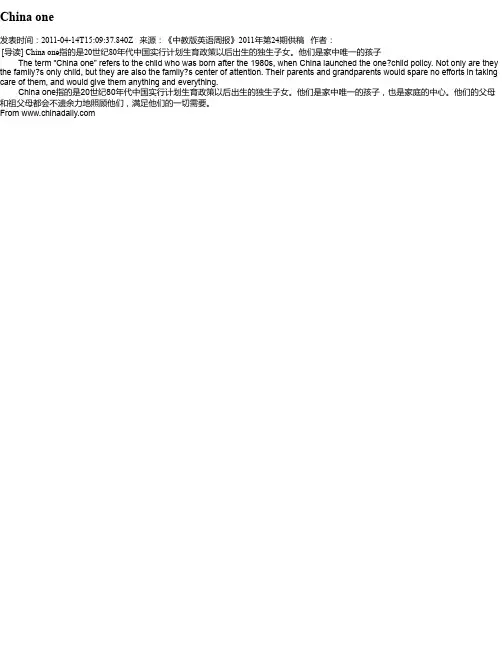
China one
发表时间:2011-04-14T15:09:37.840Z 来源:《中教版英语周报》2011年第24期供稿作者:[导读] China one指的是20世纪80年代中国实行计划生育政策以后出生的独生子女。
他们是家中唯一的孩子 The term “China one” refers to the child who was born after the 1980s, when China launched the one?child policy. Not only are they the family?s only child, but they are also the family?s center of attention. Their parents and grandparents would spare no efforts in taking care of them, and would give them anything and everything. China one指的是20世纪80年代中国实行计划生育政策以后出生的独生子女。
他们是家中唯一的孩子,也是家庭的中心。
他们的父母和祖父母都会不遗余力地照顾他们,满足他们的一切需要。
From 。
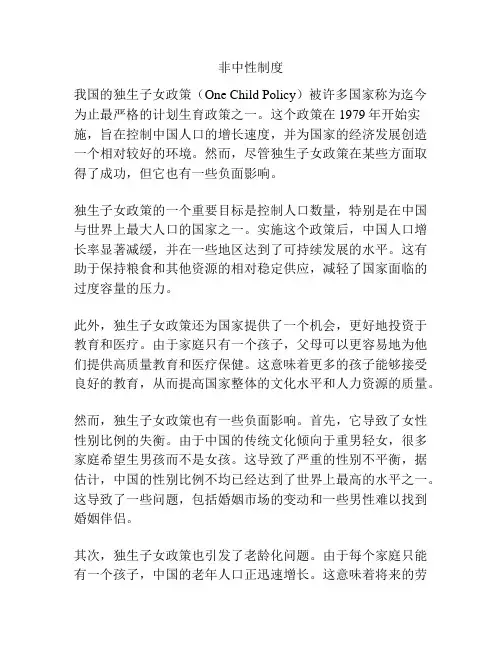
非中性制度我国的独生子女政策(One Child Policy)被许多国家称为迄今为止最严格的计划生育政策之一。
这个政策在1979年开始实施,旨在控制中国人口的增长速度,并为国家的经济发展创造一个相对较好的环境。
然而,尽管独生子女政策在某些方面取得了成功,但它也有一些负面影响。
独生子女政策的一个重要目标是控制人口数量,特别是在中国与世界上最大人口的国家之一。
实施这个政策后,中国人口增长率显著减缓,并在一些地区达到了可持续发展的水平。
这有助于保持粮食和其他资源的相对稳定供应,减轻了国家面临的过度容量的压力。
此外,独生子女政策还为国家提供了一个机会,更好地投资于教育和医疗。
由于家庭只有一个孩子,父母可以更容易地为他们提供高质量教育和医疗保健。
这意味着更多的孩子能够接受良好的教育,从而提高国家整体的文化水平和人力资源的质量。
然而,独生子女政策也有一些负面影响。
首先,它导致了女性性别比例的失衡。
由于中国的传统文化倾向于重男轻女,很多家庭希望生男孩而不是女孩。
这导致了严重的性别不平衡,据估计,中国的性别比例不均已经达到了世界上最高的水平之一。
这导致了一些问题,包括婚姻市场的变动和一些男性难以找到婚姻伴侣。
其次,独生子女政策也引发了老龄化问题。
由于每个家庭只能有一个孩子,中国的老年人口正迅速增长。
这意味着将来的劳动力将面临很大的压力,同时也增加了养老金和社会保障支出的负担。
这可能对国家经济造成一定的负面影响。
最后,独生子女政策还导致了一些心理上的问题。
独生子女通常受到过多的家庭关注和期望,这可能给他们带来很大的压力。
此外,他们也经历了缺乏兄弟姐妹的互动和竞争,这可能影响他们的社交能力和个人发展。
总的来说,尽管独生子女政策在控制人口数量方面取得了一定的成功,并为国家提供了一些机会,但它也带来了一些负面影响。
解决这些问题需要政府采取更多措施,以平衡计划生育政策的利弊,并更好地满足人们的需求和期望。
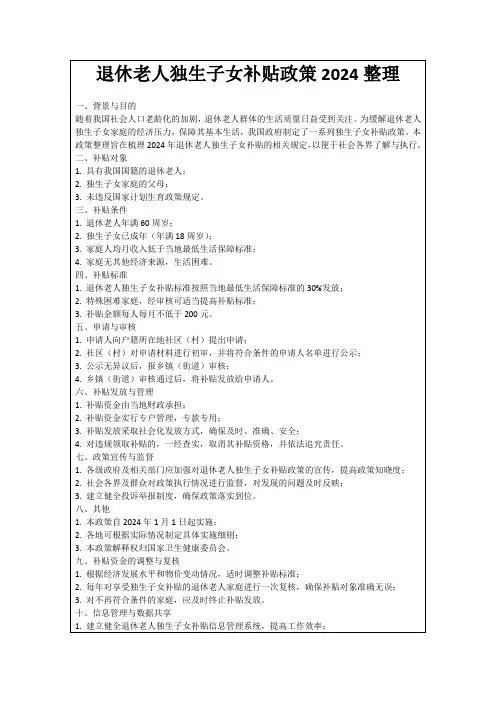
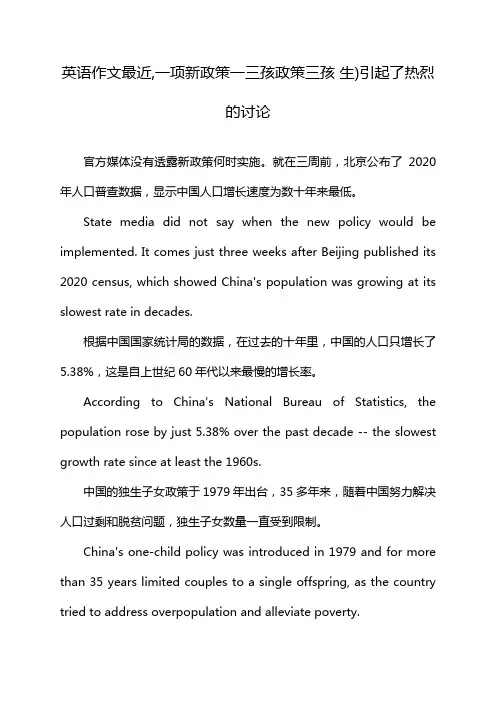
英语作文最近,一项新政策一三孩政策三孩生)引起了热烈的讨论官方媒体没有透露新政策何时实施。
就在三周前,北京公布了2020年人口普查数据,显示中国人口增长速度为数十年来最低。
State media did not say when the new policy would be implemented. It comes just three weeks after Beijing published its 2020 census, which showed China's population was growing at its slowest rate in decades.根据中国国家统计局的数据,在过去的十年里,中国的人口只增长了5.38%,这是自上世纪60年代以来最慢的增长率。
According to China's National Bureau of Statistics, the population rose by just 5.38% over the past decade -- the slowest growth rate since at least the 1960s.中国的独生子女政策于1979年出台,35多年来,随着中国努力解决人口过剩和脱贫问题,独生子女数量一直受到限制。
China's one-child policy was introduced in 1979 and for more than 35 years limited couples to a single offspring, as the country tried to address overpopulation and alleviate poverty.近年来,中国经济蓬勃发展,人口需求也发生了变化。
如今,政府依靠大量年轻劳动力来支持高水平的经济增长。
为了避免人口危机,中国政府在2015年宣布放宽生育限制,允许每个家庭最多生育两个孩子。
国家独生子女补贴2023最新政策规定独生子女的政策补贴1、独生子女父母奖金补贴独生子女父母在《独生子女父母光荣证》颁发后,截至子女14周岁(各省市法规有所不同),凭证件就可以领取独生子女父母奖金补贴,每个地区补贴的金额不同,最高为2000元,每月补贴10-80元不等。
2、独生子女生育奖励扶助补贴这是针对农村独生子女父母,在年满60周岁以后,可享受生育家庭奖励扶助补贴,每人每年960元,但是需要保留好自己的《独生子女父母光荣证》,凭证领取。
3、独生子女家庭伤残扶助补贴如果因为独生子女出现意外伤残,每月可以领取270元的补贴。
4、独生子女人员死亡补贴除了伤残意外,独生子女如果因为意外身故,他(她)的直系亲属都能每人每月领到340元的补贴抚恤金。
5、独生子女教育补贴对于农村独生子女家庭,我国也会给予一定的教育补贴,主要体现在两个方面:(1)可享受高考加分优惠法规;(2)发放现金补贴,补贴金额一般在1000-3000元。
对于贫困家庭还可以免除学杂费。
6、独生子女个税减免个税起征点目前是5000元,如果独生子女父母已经超过60岁,那么每月能够享受2000元的个税减。
7、独生子女护理假我国对独生子女是提供了护理假的,不同地区假期天数有所不同。
8、一次性奖励补贴父母一次性奖励一般是在退休时领取,全国并未设定统一标准,各个地区是不一样的,北京地区独生子女父母一次性奖励发放不低于1000元;上海一次性奖励补贴标准是5000元;河北是3000元;武汉是3500元。
2023年企业政府补贴政策有哪些?2023年企业政府补贴政策有:阶段性降低失业保险费率,按1%执行,其中单位费率0.7%,个人费率0.3%。
阶段性缓缴社保费,允许企业在2023年底前采取分期或逐月等方式补缴缓缴的社会保险费,补缴期间免收滞纳金。
稳岗返还,中小微企业按企业及其职工上年度实际缴纳失业保险费的60%返还,大型企业按30%返还。
大学生就业补助政策一、补贴标准全国大中专院校2021推荐双方都可获得就业、实习补贴1200元/人/年(3人),以100元/人/月标准按月发放。
独生子女费功能科目独生子女费(One Child Policy Fee)是中国政府为了平衡人口问题而实行的一项政策。
自1979年起,中国实施了独生子女政策,限制每对夫妇只能生育一个孩子。
为了确保这一政策的顺利实施,政府收取了独生子女费。
独生子女费是中国家庭所需支付的一项费用,用于弥补由于只能生育一个孩子而造成的人口减少。
这笔费用通常是在孩子出生时一次性支付,按照家庭所在地的经济发展水平和户籍属性的不同而有所不同。
一般来说,经济发达城市的独生子女费较高,而农村地区则相对较低。
独生子女费的主要功能是实施政府的人口控制政策。
中国作为世界上人口最多的国家之一,人口问题一直是长期以来政府亟待解决的难题。
通过限制每个家庭只能生育一个孩子,政府成功地控制了人口增长速度,使得中国能够更好地利用资源,提高人民的生活水平。
此外,独生子女费还有一定的财政收入作用。
政府通过收取这笔费用,可以用来支持社会福利事业,例如教育、医疗等。
这些钱可以用于改善教育资源,建设更多的学校、图书馆和实验室,提升教育质量。
同时,这笔费用也可以用于改善医疗环境,提供更好的医疗设施和服务。
通过这样的方式,政府为独生子女提供了更好的教育和医疗条件,提高了人民的福利水平。
从另一个角度来看,独生子女费也有一定的指导意义。
通过收取这笔费用,可以促使家庭在生育孩子时更加理性。
由于经济压力和教育竞争的不断增加,一些家庭可能会考虑生育多个孩子,以便给独生子女提供更好的成长环境。
然而,通过收费的方式,政府能够提醒家庭慎重考虑生育问题,并减少不必要的二孩现象。
总结起来,独生子女费是中国政府为了平衡人口问题而收取的费用。
它的功能包括实施人口控制政策、提供财政支持、改善教育和医疗条件,以及引导家庭生育行为。
通过合理使用这笔费用,政府可以更好地解决人口问题,并提高人民的福利水平。
2024年退休独生子女补贴政策2024年,我国将出台一项新的政策,针对退休独生子女提供补贴。
这一政策将对独生子女在养老阶段的生活提供更多支持,体现了国家
对独生子女的关爱和重视。
政策内容包括:
1. 定期发放补贴:政府将定期向符合条件的退休独生子女发放一定
金额的生活补贴,以减轻其生活负担。
2. 医疗保障:政府将为退休独生子女提供全方位的医疗保障,包括
门诊、住院和慢性病治疗等。
3. 社会关爱:政府将组织各类活动,关爱退休独生子女,帮助他们
建立健康、积极的生活态度。
4. 心理辅导:政府将设立心理辅导机构,为退休独生子女提供心理
咨询和帮助,帮助他们调整心态,面对退休后的生活。
5. 提供就业机会:政府将优先考虑退休独生子女的就业需求,为他
们提供更多的就业机会,并加大对其就业的支持力度。
这一政策的出台,将为退休独生子女提供更好的生活保障,增强他
们的幸福感和获得感,也进一步体现了国家对独生子女的关心和支持。
相信在这一政策的帮助下,退休独生子女们的生活将更加美好,更加
幸福。
独生子女家庭补贴政策
随着我国经济的快速发展,独生子女家庭补贴政策在当今社会已经成
为一项重要的福利政策。
这项政策是针对只有一个孩子的家庭而设立的,其目的是为了减轻独生子女家庭的经济负担,促进家庭和睦、社
会和谐的建设。
首先,这项政策的申请条件十分简单。
只要父母都有中国国籍,孩子
是独生子女,家庭符合政策规定的经济条件,就可以在当地政府提出
申请。
此外,政策的核查和审核都非常严格,保证了政策的公平和合
理性。
这也为符合条件的家庭提供了广阔的申请范围和良好的政策保障。
其次,政策的普及性很高。
除了政府自身的宣传和推广外,各大媒体
也积极参与到政策的宣传工作中。
特别是针对家庭经济困难的家庭申请,政府还为他们提供了免费的咨询服务和申请办理指导,方便了家
庭申请的流程。
同时,政策的实施也毋庸置疑。
家庭申请获得政策的补贴后,政府会
及时将资金拨付到家庭指定的银行账户中。
此外,政策的补贴也非常
有力,补贴金额足以为家庭的经济困难提供有效的缓解和帮助。
最后,政策的推出对于促进家庭和谐和社会的和谐也具有积极的意义。
随着人们对于生活品质和生活水平的不断意识提升,家庭的经济负担
也随之加重。
政府针对独生子女家庭的补贴政策,不仅为孩子提供了
优渥的成长环境和生活条件,也保障了家庭经济的健康稳定,促进了
家庭和谐和社会的稳定发展。
总之,独生子女家庭补贴政策已成为一项重要的福利政策,得到了社会各界人士的支持和赞誉。
在今后,政府应继续加大力度,扩大政策覆盖面,为更多独生子女家庭提供良好的政策保障和支持。
独生子女父母补贴领取的流程及时间独生子女父母补贴是中国政府为了鼓励计划生育政策并支持独生子女家庭所设立的政策。
The subsidy for parents of only child is a policy set upby Chinese government to encourage the one-child policy and support families with only one child.申请补贴需要向当地计划生育政府部门提交相关材料,包括身份证、户口本、结婚证、孩子的出生证等。
To apply for the subsidy, you need to submit relevant documents to the local family planning government department, including ID cards, household registration book, marriage certificate, child's birth certificate, etc.经审核通过后,可以领取每月的补贴,一般是通过银行卡发放。
After being approved, you can receive the monthly subsidy, which is usually distributed through a bank card.另外,还可以选择一次性领取全年的补贴。
In addition, you can also choose to receive the subsidy for the whole year in one lump sum.补贴的标准和领取条件因地区而异,具体情况需咨询当地计划生育政府部门。
The standards and conditions for receiving the subsidy vary from region to region, and you should consult the local family planning government department for specific details.一般来说,申请补贴的时间是每年的年初,具体日期会根据当地政策而有所不同。
Chian’s one child policy
Cause:
In 1980,the Xinhua news agency announced a prediction of Songjian about china’s population development process, it said that if china’s population continue to develop so quickly, there will be over 1.4 billion people until 2000 and 4 billion people until 2050 in china. After the announcement, many people felt shocked and panic. Some experts thought the large number of population would block the development of economy. Also, it would cause the shortage of some natural resources. In September,1980, the fifth Chinese national people’s congress set up the goal that we should make Chinese population less than 1.2 billion at the end of 20 century. So, without rigorous argument,(严密的论证) one-child policy was carried out in1980s.
Positive effect:
1,promote the financial accumulation of the society. Because there are less new-born people, the consumption also reduce, so we can save more money.(加速资金积累)
2,It became easier for people to find a job because there are less people and less employment pressure. At the same time ,it can also promote the development of economy.(利于劳动就业)3,It can make children receive more and good education, because our country can use the money which we save from the policy to improve the quality of education. And parents who only have one child can have more money to pay for our educational fare.(促进教育,提高人口质量)
4,A family don’t need to raise many chidren, so they have more money to pay for their entertainment, their life can be more colorful.(享乐消费)
Negative effect:
1, The aging process has been speed up because of one-child policy. It was believed that our country will become a aging society in 2020. however, our country’s statistic office find that we have become a aging society in October,1999.
2, The sex ratio become bigger. The newest ratio of male and female is 117:100. it means that there will be more and more men can not find a wife. This problem will lead to more serious social contradiction and social crisis.
3, Another crisis is about the growing of children. If the only child of a family can not grow up healthily or died because of illness or accident, it will be a great hit to the family. Also, the family become incomplete and there will be nobody who can take care of the old parents, and the social pressure will become heavier. Statistics from the fifth demographic census(第五次人口普查)show that there are over 570,000 families who used to have a child but now haven’t.
4, the children will bear much more pressure in raising old family members. If there is only one child in a family, it means that he should in charge of supporting 4 old family members himself. There will be more problems about whether the child has enough money to support the family, whether there are enough room for them to live and so on.
5, the society also bear much pressure, because more old people mean that we must development social security system. However, a research show that our country have owed retired old people 2trilion yuan. 5,the crisis of social development. As there are more and more old people and less and less young people who can work, economy may be influenced. Meanwhile, it may also lead to crisis of national defense because there are not enough young and strong people who can join the army and protect our country.
In my opinion, this policy do some benefit to the society at the beginning. However, we can see the disadvantage of it overweight the advantage from my analysis just now. so I think that we should adjust the policy according to the situation in different regions. Such as in those districts which have serious aging effect, we should give up the policy. But in those districts which still have high rate birth, we should keep the policy. Meanwhile, the government should take more suggestion from all fields of the society into consideration. It is because that one-child policy didn’t consider about people’s suggestions before it was carried out, now there are many problems we can not solve. So, I believe if the government take more suggestion from people, problems can be reduced.。